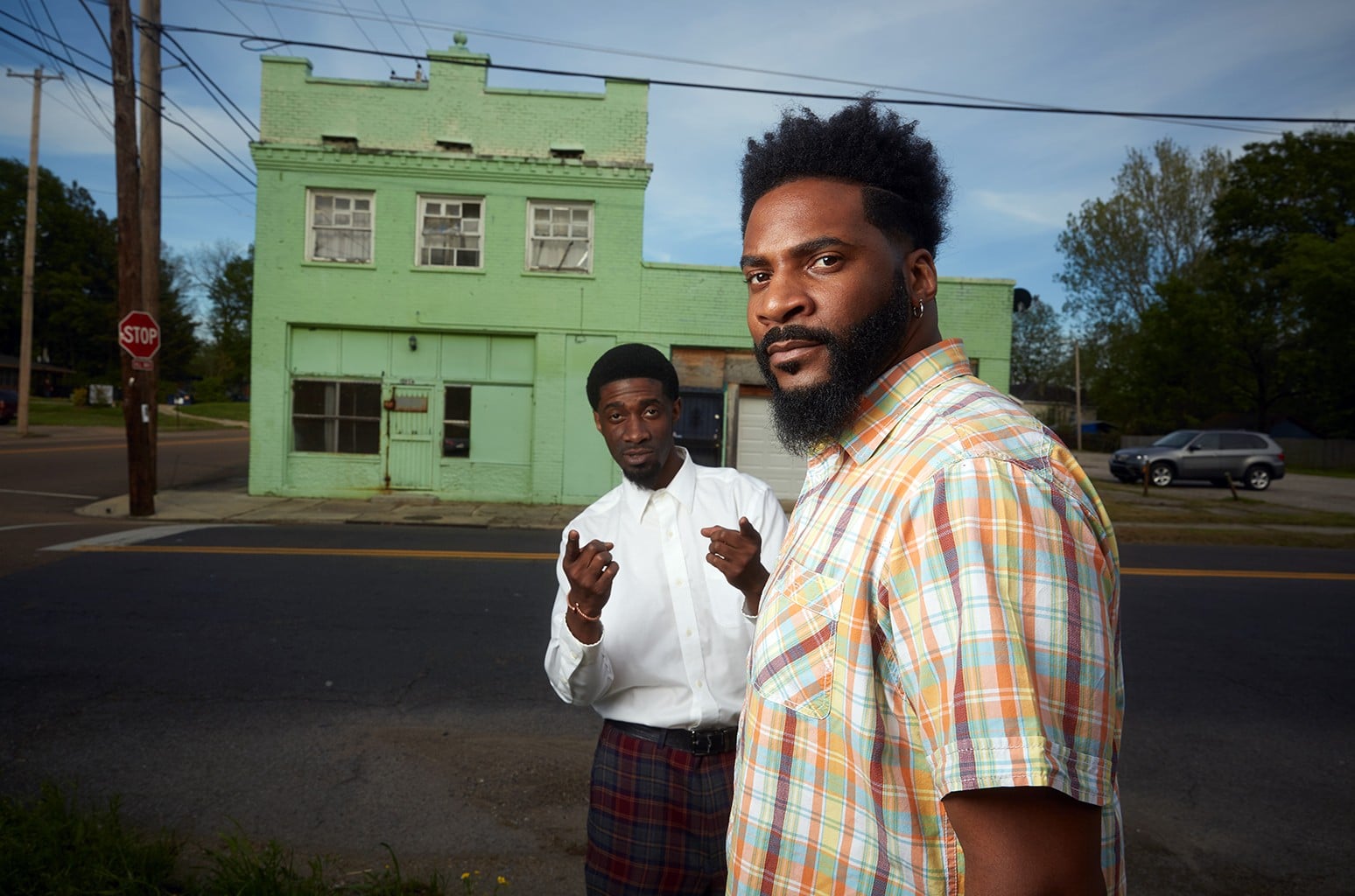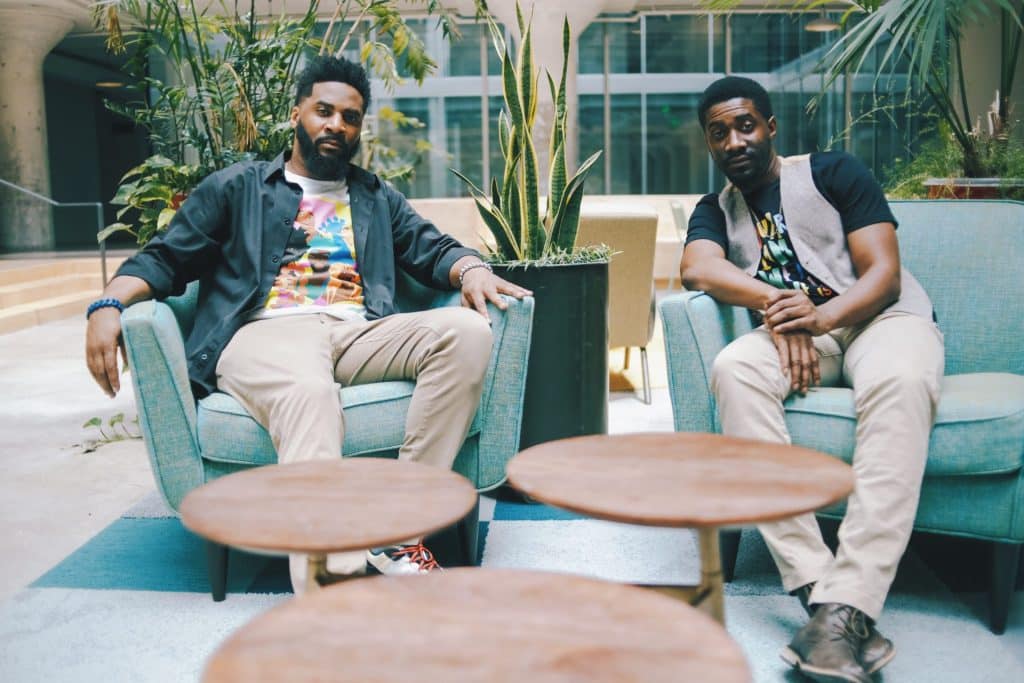The Sensational Barnes Brothers reminds listeners of the Saturday night/Sunday morning tensions between gospel and early soul music. Both forms find roots in the uneasy relationship between juke joint rhythm & blues and the hymns of the churchgoing experience. Early gospel acts like Sam Cooke and Aretha Franklin found their initial success in the church before crossing over—not without controversy– into the world of secular music, while some like Mahalia Jackson remained faithful to their calling. Even though Cooke’s 1957 single “Loveable” (released under his alias “Dale Cooke”) drew a line between gospel and soul, both genres were forever linked by an almost riotous fervor and beat.
Six decades later, the Barnes brothers— Chris and Courtney— have found that same beat, walking the line between a message of witness and the greasy rhythms of Stax staples like Booker T. and The MG’s. For Chris, devoting his life to evangelizing wasn’t a difficult decision: “For me, the music is a language. There’s so much to sing about. We do sing about love. The message that we bring is about God and how God is love. He created love, so we can sing about love in different ways–the love that God has for us, the love from a man to a woman, or vice versa between people. It’s easy for me because I love the music. We try to be careful about what we’re singing, being watchful. It’s not a hard thing. The music speaks so well.”
Chris stresses that gospel isn’t about preaching moral or spiritual superiority. Their music, instead, is an opportunity for communion. He says, “I think at the very basic understanding of humans is we have a good nature. There’s a good nature in people, and then when they hear the message, I think it’s something they connect with– even if they’re not religious or spiritual people. I don’t think there’s anybody in this world that doesn’t know about God. I think that’s how the message is so easily transferred to people when we’re doing a festival. Yes, we enjoy that people are having drinks. We encourage that because our message is we’re not trying to present perfection, but we want you, as well as us, to try to do the right things. We’re not preaching perfection, so you don’t have to be a perfect person. but the trying is what matters.”

The brothers seemed destined for a life of song. Their mother Deborah was a Raelette, backing up Ray Charles, another gospel-turned-soul legend, while their late father Calvin “Duke” performed as a solo gospel singer. Memphis, their hometown, provided templates and opportunities to follow in their parent’s lead to the stage. “It’s just an absolute blessing,” Chris says, “that I was raised and born in this place, surrounded by so many great musicians and artists. What it does is give you thick skin, because Memphis offers a wealth of talent. Even performing at home can sometimes be tough because people know what the music is supposed to sound like or how they want it to feel. But when you go out, you’re prepared for that, and it’s actually easier to perform away from home than it is home.”
In 2019, Fat Possum’s Bruce Watson founded Bible & Tire Recording Company, an imprint devoted to the sounds of Southern gospel. For one of the label’s inaugural releases, Watson chose the Barnes Brother’s debut, Nobody’s Fault But My Own. The album comprises 11 songs from the 1970s Memphis gospel label Designer Records. The brothers and Watson could have faced an impossible task, trying to find common ground as they mined the Designer’s catalog. Instead, they shared a headspace. Chris explains, “My brother and I picked 13 songs that we liked, and Bruce, who’s the owner the label, picked 13 songs. Ironically, of those 13 songs that we picked, we picked 10 of the same songs. So it was like, ‘Yeah, let’s do these songs!’”
The result is a record that sounds at home next to the fiery, unchained works of the Reverend Charlie Jackson and Pastor T.L Barnett, figures who have been justly rediscovered and canonized by religious and secular audiences. Slow burns like “I Feel Good” and “Try the Load” are songs from a heart eased by faith; others like “I Made It Over,” the title cut, and “Why Am I Treated So Bad” explode, the band nearly tripping over themselves with elation.
But it’s songs like “I Won’t Have To Cry” and “Beautiful Mansion” that most resonate, the brothers stressing patience and perseverance, confident that their reward awaits them, unconditionally. Their condition– composure and endurance– seems almost unfathomable in an age of instant gratification. “Those songs,” Chris says, “are really telling, especially for Courtney and me. These are the good things. We have endured some hard times, especially in our careers and reaching a certain [level] in our careers. Being patient is definitely a winning formula for success because you just never know when that thing might blow.”
Released in 2019, Nobody’s Fault was a victim of circumstance, its promotion upended by the pandemic. “We recorded that album,” Chris laments, “and we had a show at the Lincoln Center and a few of the dates coming up, but we were never able to do them because COVID shut it down. But we’ve found momentum again. We did a folk festival back in February of this year, a showcase, basically. We did a couple of shows from there. We were able to obtain a booking agent with Crossover Touring. We already had management in place for these types of moves, so we were able to book about 37 to 40 shows from that one showcase, so there’s definitely momentum.”

Given the chance, Nobody’s Fault can achieve that same crossover appeal as other gospel-soul touchstones. It’s raw and occasionally unchecked, part of a lineage that includes sides by Sister Rosetta Tharpe and Brother Claude Ely, artists considered sacred by more worldly garage punks. Yet Chris remains steadfast in the group’s missionary purpose– exposing audiences to an unfamiliar music and message. “Our music,” he says, “is everyday life. It has some significant meaning, but it’s also our normal day-to-day life because we live in the Bible Belt. It’s also eye-opening that people outside of this place, folks not from the South, they don’t get this type of singing all the time. They’ve never heard it. It’s not something that they’re used to. It’s definitely an honor to be able to present this style of music that’s been around for so long to a new audience. It’s a new thing for them.”
And what to do with this new thing? “Keep doing what you’re doing, and just let it be good,” sing the brothers on “Let It Be Good.” Chris says, “It’s a song that my dad was on, one of his last recordings. We were raised this way, so even if my faith wavers, it’s something that was instilled in us as children. When there’s nothing else that you can do in your own power,” Chris says, “You gotta lean and depend on something. And if it’s not something that’s necessarily tangible, there’s a higher power that gives us rest and peace in those troubled times. That’s basically how I maintain faith when it becomes too much. I take my hands off of it, and I give it to my higher power. I’ll let them handle it.”
The Sensational Barnes Brothers will appear at The Blind Willie McTell Music Festival on September 23rd in Thomson, GA! See performances by The Barnes Brothers, Jon Cleary, Shemekia Copeland, and many, many more.
Charlie Farmer is a Georgia writer and professor who loves his wife, his daughters, his students, his cats, his books, his LPs, and everything else one should love in life.
